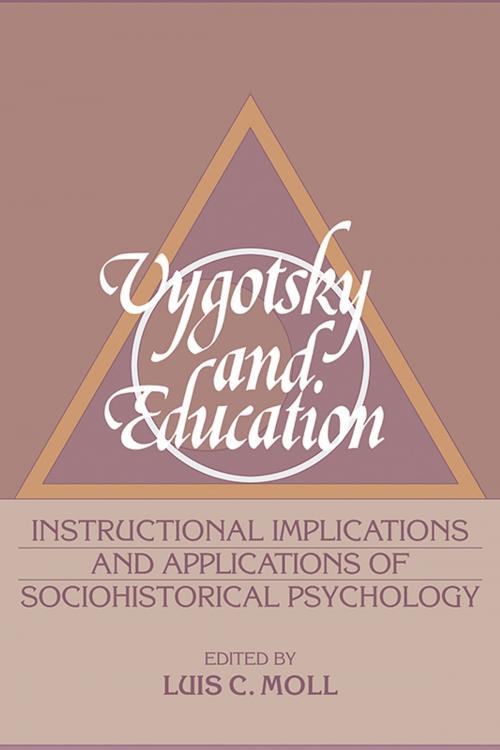Vygotsky and Education
Instructional Implications and Applications of Sociohistorical Psychology
Nonfiction, Reference & Language, Education & Teaching, Educational Theory, Educational Psychology, Health & Well Being, Psychology| Author: | ISBN: | 9781107384804 | |
| Publisher: | Cambridge University Press | Publication: | November 30, 1990 |
| Imprint: | Cambridge University Press | Language: | English |
| Author: | |
| ISBN: | 9781107384804 |
| Publisher: | Cambridge University Press |
| Publication: | November 30, 1990 |
| Imprint: | Cambridge University Press |
| Language: | English |
The seminal work of Russian theorist Lev Vygotsky (1896–1934) has exerted a deep influence on psychology over the past 30 years. Vygotsky was an educator turned psychologist, and his writings clearly reflected his pedagogical concerns. For Vygotsky, schools and other informal educational situations represent the best cultural laboratories to study thinking. He emphasized the social organization of instruction, writing about the 'unique form of cooperation between the child and the adult that is the central element of the educational process'. Vygotsky's emphasis on the social context of thinking represents the reorganization of a key social system and associated modes of discourse, with potential consequences for developing new forms of thinking. This volume is devoted to analyzing Vygotsky's ideas as a means of bringing to light the relevance of his concepts to education. What does Vygotsky's approach have to offer education? Distinguished scholars from various countries and representing several disciplines discuss the essence and significance of Vygotsky's work, analyze the educational implications of his thoughts, and present applications in practice, addressing educational issues such as school organization, teacher training, educational achievement, literacy learning and development, uses of technology, community-based education, and special education.
The seminal work of Russian theorist Lev Vygotsky (1896–1934) has exerted a deep influence on psychology over the past 30 years. Vygotsky was an educator turned psychologist, and his writings clearly reflected his pedagogical concerns. For Vygotsky, schools and other informal educational situations represent the best cultural laboratories to study thinking. He emphasized the social organization of instruction, writing about the 'unique form of cooperation between the child and the adult that is the central element of the educational process'. Vygotsky's emphasis on the social context of thinking represents the reorganization of a key social system and associated modes of discourse, with potential consequences for developing new forms of thinking. This volume is devoted to analyzing Vygotsky's ideas as a means of bringing to light the relevance of his concepts to education. What does Vygotsky's approach have to offer education? Distinguished scholars from various countries and representing several disciplines discuss the essence and significance of Vygotsky's work, analyze the educational implications of his thoughts, and present applications in practice, addressing educational issues such as school organization, teacher training, educational achievement, literacy learning and development, uses of technology, community-based education, and special education.















